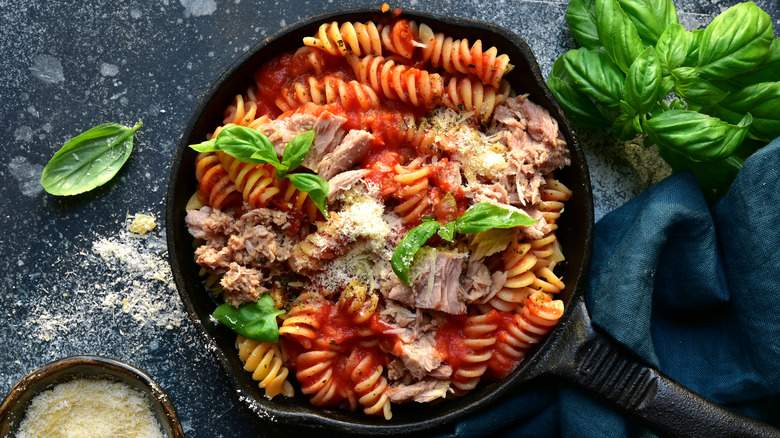Michael Symon Warns To Not Cook Acidic Foods In Cast Iron
It would be easy to say that cast iron is having a moment. Celebrity chefs like Ree Drummond and Ina Garten extol its virtues on their cooking shows (The Pioneer Woman has 25 cast iron skillets), and the brand behind the trendy Always Pan even came out with an enameled cast iron option (via Our Place). But the truth is, cast iron has been around for a long time (since about 200 AD in China, according to Webstaurant Store), and since its origination has been used to make all kinds of cookware, from woks to cornbread molds and more.
Cast iron is beloved for its versatility in the kitchen. Everything from seared steaks to crispy potatoes and even gluten-free skillet brownies can be made in cast iron, and there's just something cozy and homey about how a cast iron skillet looks when resting on the stovetop. But even though they're versatile, there are some foods you should never cook in a cast iron skillet (especially if your pan isn't seasoned properly). Chef Michael Symon recently took to Twitter to share some information about what kind of foods he thinks you should avoid making in your cast iron cookware, along with, helpfully, the reason why.
It's all about flavor
According to Michael Symon, there's one main reason why you shouldn't cook acidic foods in cast iron. When a fan on Twitter asked, "You said on your show the other day that cast iron reacts to acid. Can you elaborate on that?" Symon responded, "You will get a slight metallic taste if you cook acidic foods in cast iron." That being said, if you find yourself wondering, "Can I cook tomatoes in cast iron?" the answer is yes, sometimes — as long as they're added toward the end of cooking. America's Test Kitchen found that at the 30-minute mark, tomato-based dishes start to take on a metallic flavor, so if you'll be cooking them for less time than that, you should be okay.
But the metallic taste of acidic food cooked in cast iron isn't the only reason why you should avoid pairing the two. There's actually some damage acidic food can do to your cast iron pan, including eating away at the precious seasoning that makes the pan so non-stick. If you still decide to cook an acidic dish in your trusty skillet, make sure your cast iron is seasoned properly before you start — and, on that note, don't forget to re-season your cast iron pan. Other than that, don't cook the acidic ingredients for more than 30 minutes, and be sure to remove any leftovers from the pan as soon as they're done cooking to help cut down on any of the negative effects of pairing iron with acid.

